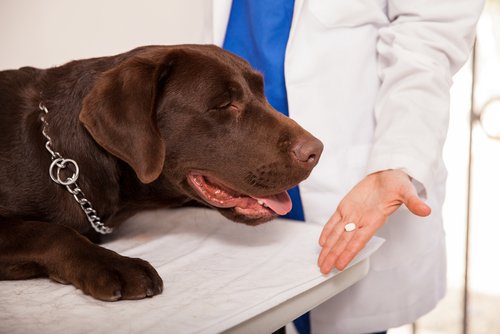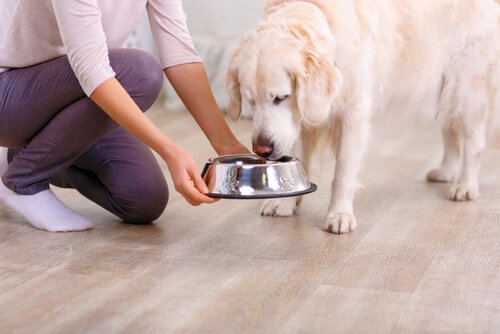What's the Best Supplement for Your Dog?

It’s essential that animals obtain all the vitamins they need from their meals. However, this often isn’t the case and so the veterinarian might prescribe a particular supplement for your dog.
Dog food is full of essential nutrients, and so we always recommend that you find the highest quality brands out there. It’s interesting to note that these aren’t necessarily the most expensive ones.
The best supplement for your dog
Even though we feed our pets to the best of our knowledge and resources, they could still be deficient in certain nutrients. You should also know that an excess of vitamins can also be counterproductive to an animal.

In the case of an overload of fat-soluble vitamins, the body doesn’t discard them. Instead, what it does is store them in the fatty tissue and the liver, causing serious damage.
Consult your veterinarian to find out what’s best for your dog. After pets reach a certain age, it’s harder for them to recover from illnesses or accidents. Also, they could be anemic, or show signs of muscle and/or bone injuries. Or, in the case of young dogs, they may need a supplement in their diet in order to develop properly.
Vitamins are a good supplement for your dog
Our pets need to have an adequate dose of several different vitamins. Each supplement has different properties and all together provide everything a dog’s body system will need.
Here is what the main vitamins do in our body:
- Vitamin A is essential for vision, immunity, growth, and development. It’s described as an “anti-infection” vitamin since it protects your body from infections.
- Vitamins B1, B2, B3, and B5 are required for good mental health, proper digestion and functioning of the nervous system, regeneration of red blood cells, and skin and hair growth. The reason for this is that they encourage blood circulation. In addition, they speed up the healing of wounds and infections, and also strengthen the immune system.
- Vitamins B6 and B12 are required for red blood cell formation and nerve function.
- Vitamin C promotes wound healing, and it also promotes healthy gums and teeth.
- Vitamin D balances calcium levels in the body. It can also help to prevent cancer by controlling cell division, as well as enhancing immunity, and regulating blood pressure.
- Vitamin E aids in the prevention of heart disease, cancer, and helps to slow the aging process.
- Vitamin K speeds up the healing of wounds by maintaining bone health and encouraging cell growth.
All of these vitamins can be found in the right dog food and, of course, in most fresh foods. Ask the vet to give you some recommendations on the kinds that are best for your pet.
Olive oil for your dog

Extra virgin olive oil speeds up the healing of wounds and infections and, in addition, it strengthens the immune system. It also contains omega 3 fatty acids that promote healthy hair, skin, and organs.
With this in mind, the optimal dose is half a tablespoon a day –about 10 drops, divided into two daily doses, one in the morning and the other one at night. Additionally, olive oil has a rather pleasant flavor that blends well with their food so dogs won’t hesitate to eat it.
The fatty acids of extra virgin olive oil are a perfect complement to a dog’s diet, as well as the ultimate medicinal supplement. By the same token, this oil provides vitamin E, polyphenols and antioxidants that help reverse senile diseases.
Olive oil also enhances the health and the beauty of a dog’s fur. In addition, it improves their physical and mental agility, extends their lives, helps them avoid constipation, and is particularly recommended for brachiocephalic breeds (Pug, Bullmastiff, Bulldog, Boston terrier etc.). This is because it improves their lung health and helps their oxygen intake each time they breathe.
Don’t hesitate to give your dog some extra virgin olive oil as a supplement. Why don’t you take some yourself too?
It’s essential that animals obtain all the vitamins they need from their meals. However, this often isn’t the case and so the veterinarian might prescribe a particular supplement for your dog.
Dog food is full of essential nutrients, and so we always recommend that you find the highest quality brands out there. It’s interesting to note that these aren’t necessarily the most expensive ones.
The best supplement for your dog
Even though we feed our pets to the best of our knowledge and resources, they could still be deficient in certain nutrients. You should also know that an excess of vitamins can also be counterproductive to an animal.

In the case of an overload of fat-soluble vitamins, the body doesn’t discard them. Instead, what it does is store them in the fatty tissue and the liver, causing serious damage.
Consult your veterinarian to find out what’s best for your dog. After pets reach a certain age, it’s harder for them to recover from illnesses or accidents. Also, they could be anemic, or show signs of muscle and/or bone injuries. Or, in the case of young dogs, they may need a supplement in their diet in order to develop properly.
Vitamins are a good supplement for your dog
Our pets need to have an adequate dose of several different vitamins. Each supplement has different properties and all together provide everything a dog’s body system will need.
Here is what the main vitamins do in our body:
- Vitamin A is essential for vision, immunity, growth, and development. It’s described as an “anti-infection” vitamin since it protects your body from infections.
- Vitamins B1, B2, B3, and B5 are required for good mental health, proper digestion and functioning of the nervous system, regeneration of red blood cells, and skin and hair growth. The reason for this is that they encourage blood circulation. In addition, they speed up the healing of wounds and infections, and also strengthen the immune system.
- Vitamins B6 and B12 are required for red blood cell formation and nerve function.
- Vitamin C promotes wound healing, and it also promotes healthy gums and teeth.
- Vitamin D balances calcium levels in the body. It can also help to prevent cancer by controlling cell division, as well as enhancing immunity, and regulating blood pressure.
- Vitamin E aids in the prevention of heart disease, cancer, and helps to slow the aging process.
- Vitamin K speeds up the healing of wounds by maintaining bone health and encouraging cell growth.
All of these vitamins can be found in the right dog food and, of course, in most fresh foods. Ask the vet to give you some recommendations on the kinds that are best for your pet.
Olive oil for your dog

Extra virgin olive oil speeds up the healing of wounds and infections and, in addition, it strengthens the immune system. It also contains omega 3 fatty acids that promote healthy hair, skin, and organs.
With this in mind, the optimal dose is half a tablespoon a day –about 10 drops, divided into two daily doses, one in the morning and the other one at night. Additionally, olive oil has a rather pleasant flavor that blends well with their food so dogs won’t hesitate to eat it.
The fatty acids of extra virgin olive oil are a perfect complement to a dog’s diet, as well as the ultimate medicinal supplement. By the same token, this oil provides vitamin E, polyphenols and antioxidants that help reverse senile diseases.
Olive oil also enhances the health and the beauty of a dog’s fur. In addition, it improves their physical and mental agility, extends their lives, helps them avoid constipation, and is particularly recommended for brachiocephalic breeds (Pug, Bullmastiff, Bulldog, Boston terrier etc.). This is because it improves their lung health and helps their oxygen intake each time they breathe.
Don’t hesitate to give your dog some extra virgin olive oil as a supplement. Why don’t you take some yourself too?
This text is provided for informational purposes only and does not replace consultation with a professional. If in doubt, consult your specialist.








